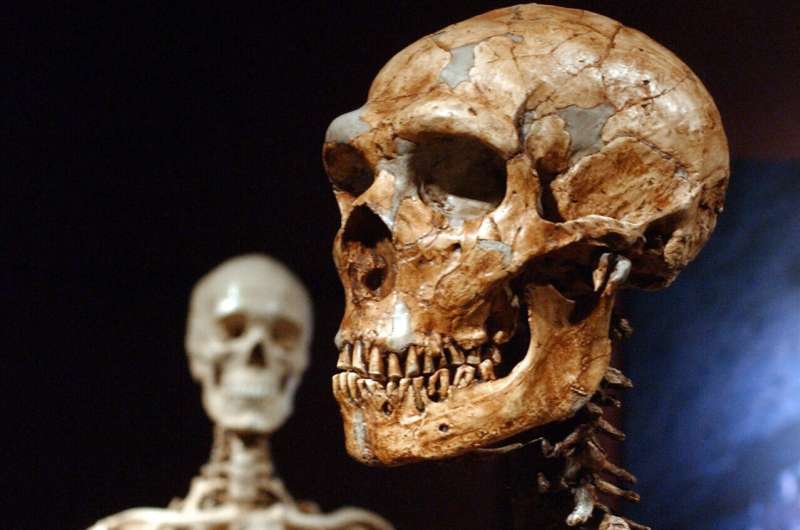
Posted on 07/17/2021 5:51:13 PM PDT by blam

This Wednesday, Jan. 8, 2003 file photo shows a reconstructed Neanderthal skeleton, right, and a modern human skeleton on display at the Museum of Natural History in New York.
What makes humans unique? Scientists have taken another step toward solving an enduring mystery with a new tool that may allow for more precise comparisons between the DNA of modern humans and that of our extinct ancestors.
Just 7% of our genome is uniquely shared with other humans, and not shared by other early ancestors, according to a study published Friday in the journal Science Advances.
"That's a pretty small percentage," said Nathan Schaefer, a University of California computational biologist and co-author of the new paper. "This kind of finding is why scientists are turning away from thinking that we humans are so vastly different from Neanderthals."
The research draws upon DNA extracted from fossil remains of now-extinct Neanderthals and Denisovans dating back to around 40,000 or 50,000 years ago, as well as from 279 modern people from around the world.
Scientists already know that modern people share some DNA with Neanderthals, but different people share different parts of the genome. One goal of the new research was to identify the genes that are exclusive to modern humans.
It's a difficult statistical problem, and the researchers "developed a valuable tool that takes account of missing data in the ancient genomes," said John Hawks, a paleoanthropologist at the University of Wisconsin, Madison, who was not involved in the research.
The researchers also found that an even smaller fraction of our genome—just 1.5%—is both unique to our species and shared among all people alive today. Those slivers of DNA may hold the most significant clues as to what truly distinguishes modern human beings.
(snip)
(Excerpt) Read more at phys.org ...
Read the bible
It’s the little things that mean the most! :)
I share NO DNA with Democrats. Did we each get 3.5%? Or is their 7% completely different from my 7%. How does this work?
Lib types tend to share more of their DNA with snakes than people, IMO.
we share 60% with a banana
https://thednatests.com/how-much-dna-do-humans-share-with-other-animals/
but then it is science.
This would mean a lot more to me if I knew exactly how Neanderthals behaved and what they were capable of. How complex was their language. Could they learn modern languages? or to read? or to argue philosophy?
If we could possibly know that about the 5 or so humanoid species thought to still be alive 100,000 years ago then we could place numbers like this in context.
Uhhh that’s an extremely large %.
But wait... I was always told that our DNA is 98.5% identical to chimpanzees. Or is that argument no longer useful?
I’m not related to that guy!
We are made in the image of our creator.
“But wait... I was always told that our DNA is 98.5% identical to chimpanzees. Or is that argument no longer useful?”
Given that 1.5% is unique to man, 98.5% might not be too far off.
“The researchers also found that an even smaller fraction of our genome—just 1.5%—is both unique to our species and shared among all people alive today.”
negative, I am a meat popsicle
But wait... I was always told that our DNA is 98.5% identical to chimpanzees. Or is that argument no longer useful?
\/
Depends on what day of the week it is for darwinists and or media.
Or what research grant is running out of cash.
Settled science and such.
Just 7% of our genome is uniquely shared with other humans, and not shared by other early ancestors…
—
93% of the DNA in a jellyfish can be found in the GOP members of Congress.
I smell Fauxiganda here.
That’s a fact, Jack.
“But wait... I was always told that our DNA is 98.5% identical to chimpanzees. Or is that argument no longer useful?”
Studies a decade ago put the number at about 88%.
Disclaimer: Opinions posted on Free Republic are those of the individual posters and do not necessarily represent the opinion of Free Republic or its management. All materials posted herein are protected by copyright law and the exemption for fair use of copyrighted works.